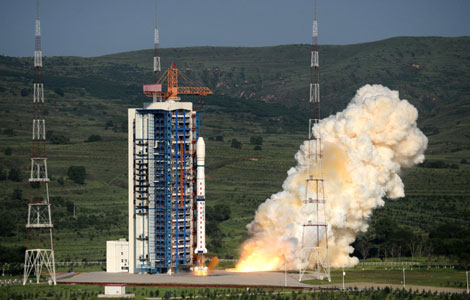C China farmers affected by tainted rice scandal
Updated: 2013-07-20 11:46
(Xinhua)
|
||||||||
CHANGSHA - Farmers in Central China's Hunan province, a major grain-producing area, have suffered huge losses during the summer harvest season due to the impact of a scandal involving cadmium-tainted rice.
Li Fangming, a farmer from the city of Yiyang, has yet to sell any of his early summer rice.
"I heard about the cadmium scandal earlier this year, but I never expected that its impact would be so great," Li said.
Three mills in Hunan's city of Zhuzhou were ordered to recall their products and suspend business operations in March after a food safety inspection in the city of Guangzhou in South China's Guangdong province found excessive amounts of cadmium, a carcinogenic industrial chemical, in their rice products.
Four months after the incident, the cause of the contamination is still unclear. The uncertainty has worried both local mill operators and farmers.
Li Xufang is faring slightly better than his peers, having sold one-quarter of his early rice. He is now busy planting late rice. But in order to fund his planting efforts, Li had to sell his rice at a price of 110 yuan ($17.8) per 50 kg to private buyers. Last year's procurement price was 140 yuan per 50 kg.
Between planting costs and sluggish growth in purchase prices, the province's early rice farmers will likely lose money this summer, according to Yuan Longping, an 83-year-old academic from the Chinese Academy of Engineering who is regarded as the "father of hybrid rice."
Gong Lixiong, owner of the Daliang Rice Mill, said that a now-empty warehouse that he previously used to store rice will be rented by the China Grain Reserves Corporation, an important rice buyer.
Gong said he will not purchase any rice this year, as it will be hard to sell under the influence of the scandal. He said he still has more than 3,000 tons of rice in storage from last year.
In past years, Yiyang's Lanxi rice market would sell 60,000 tons of rice each month. But this year, it has sold just 10,000 tons each month, down 83.3 percent year on year.
A grain depot operated by the China Grain Reserves Corporation has become the best choice for farmers, as the state-owned company can buy the rice at a protective price of 132 yuan per 50 kg, the highest price for farmers this summer.
While the state-owned depot has high demand for rice, it also has higher standards for the rice that many farmers cannot meet.
"If I had known earlier, I would not have grown any rice," said Li, who said he plans to find a new line of work in the city next year.

 'Trayvon Martin could have been me, 35 yrs ago': Obama
'Trayvon Martin could have been me, 35 yrs ago': Obama
 China launches three experimental satellites
China launches three experimental satellites
 Giving take-out roast chicken a French twist
Giving take-out roast chicken a French twist
 Tibetan farmers enjoy Onkor festival
Tibetan farmers enjoy Onkor festival
 Girl mauled by mastiff needs $32,580 for surgery
Girl mauled by mastiff needs $32,580 for surgery
 Firefighters hold line against California wildfire
Firefighters hold line against California wildfire
 Rat, rabbit head sculptures on display
Rat, rabbit head sculptures on display
 Detroit files biggest ever US municipal bankruptcy
Detroit files biggest ever US municipal bankruptcy
Most Viewed
Editor's Picks

|

|

|

|

|

|
Today's Top News
US court says reporter must testify in leak case
Venezuela VP defends support for Snowden
'Trayvon Martin could have been me': Obama
Asiana legal fallout begins after deadly crash
Floor on lending rates axed by PBOC
Huawei backs UK security review
Blacklist on way for court defiance
Tokyo's 'big leap' aimed at China
US Weekly

|

|






